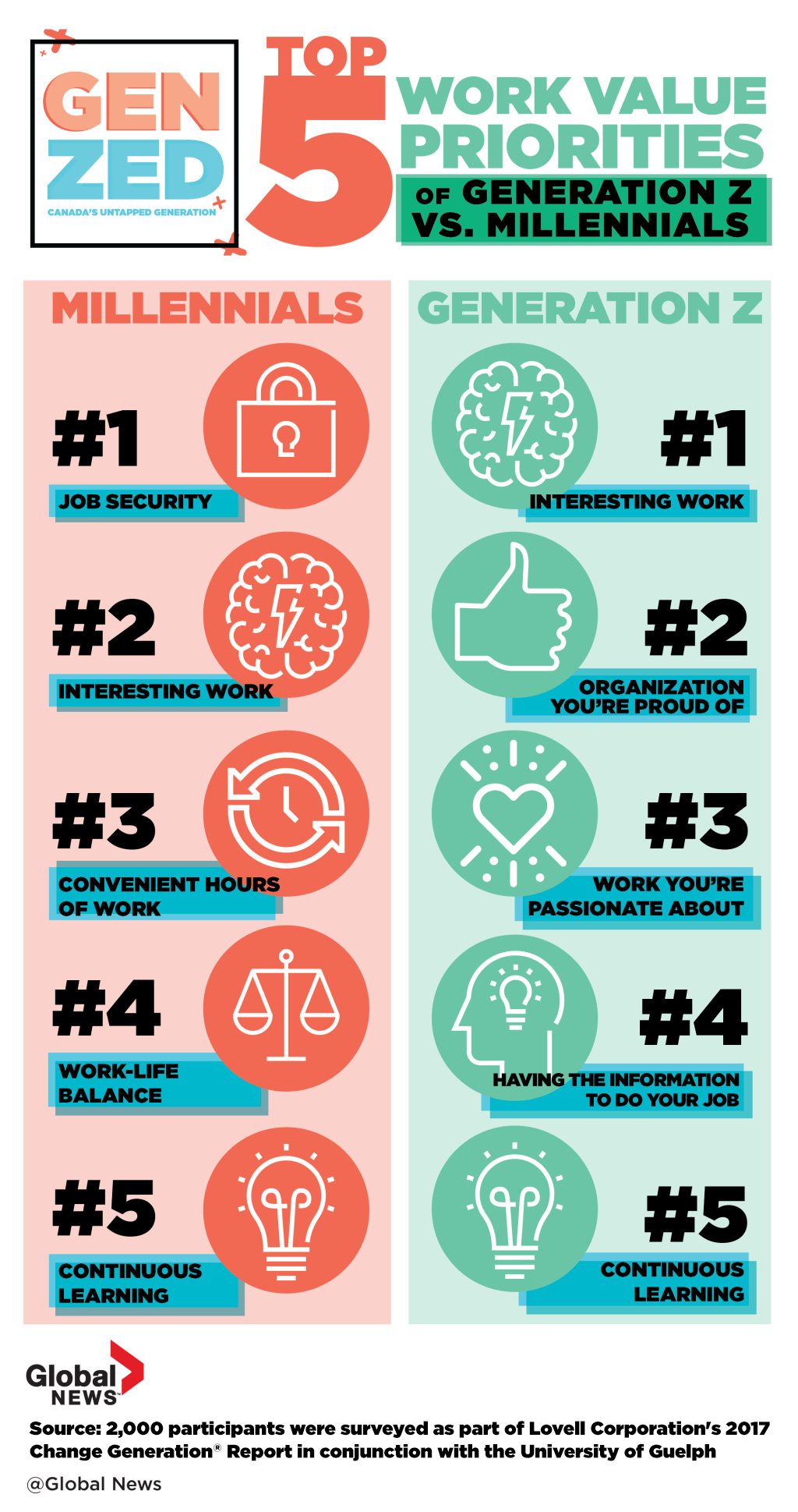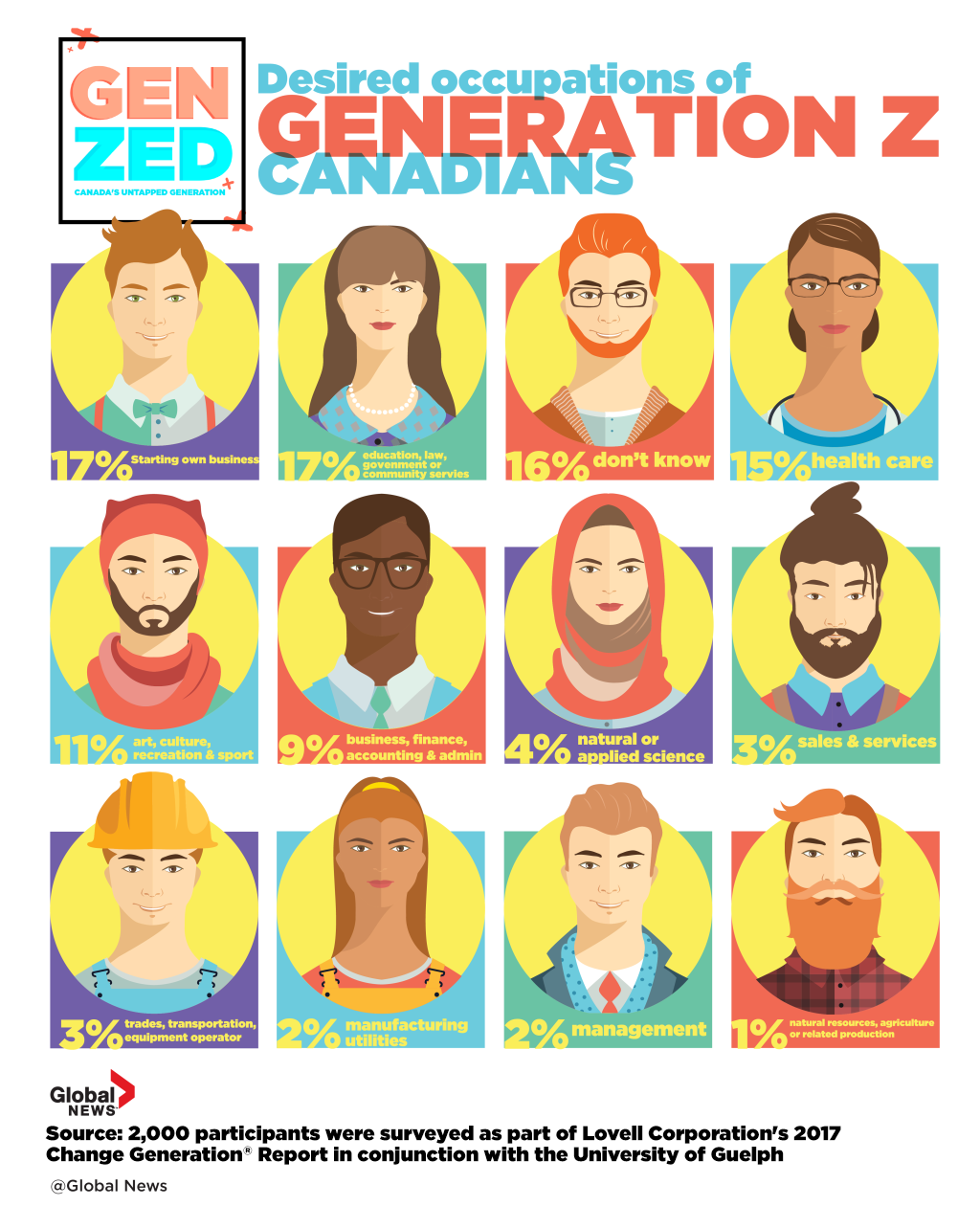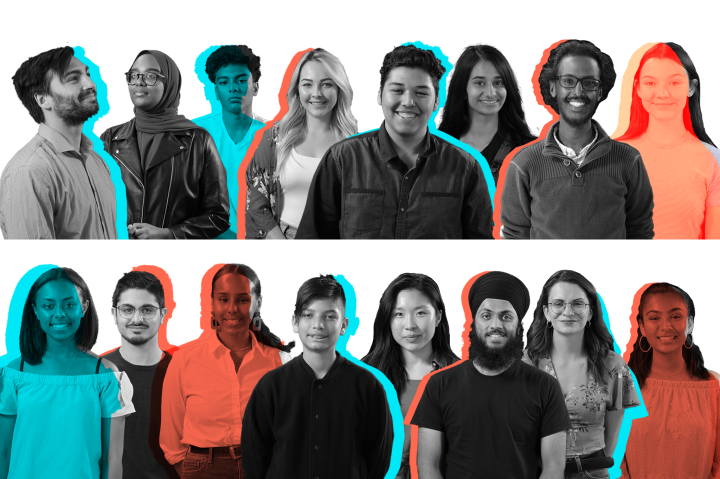
Zac Lobo, 20, dreams of working in media. Harjaap Makkar, 21, sees himself as an entrepreneur. Catherine Champion, just 14, thinks she wants to be a financial advisor.
The one common thread between the career aspirations of gen Z-ers is they’re willing to work hard to make their dreams a reality. And, for the first time in years, many experts believe their goals are attainable.
WATCH: What does generation Z want out of their careers?

Generation Z makes up roughly 17.6 per cent of Canada’s total population, according to 2017 data from Statistics Canada. Although there is no established start or end date, experts say gen Z-ers are born between 1995 and 2005, making the youngest 13 and the oldest 23. Some argue the generation ends at ages 22 (1996) or 24 (1994). This is still a growing population, one that may not have had traditional life experiences (jobs, mortgages, etc.) thrown at them. They are still optimistic about what their future holds — and truly believe they can change it.
So what does the workplace of the future look like and what will the lasting economic impact of gen Z be?
Describing gen Z in the workplace
Since gen Z-ers are just entering the workforce, data about them is in its infancy, but there are some clear trends emerging that point to what they want to do and how they want to do it.
According to Sean Lyons, an associate professor at the College of Business and Economics at the University of Guelph, the cohort is “practical” and “realistic” like baby boomers, but also “passionate” like millennials. And they process information and manage their finances like the Great Depression’s silent generation (gen Z-ers felt the repercussions of the 2008 financial crisis first-hand because their parents were impacted).
What that means is they want to be happy and productive in whatever job they end up in; if their job can help someone else along the way, then it’s a bonus. They’re also less likely to “job hop.”
The jobs they want
So which careers will gen Z-ers gravitate toward?
According to Lyons, anything in health care, education and philanthropy.
“I really want to bridge arts and activism, namely in the field of like environmental issues and sustainability because I really fear that if we continue our lifestyles as they are now, then they will pose a great danger to the world,” says 17-year-old Alice Cheng. “So I want to try and stop that or at least prevent, you know, let’s say the negative effects of climate change impacting us all too quickly. I’ve really been interested in leveraging my influence from social media and also possibly branching into the entertainment industry and seeing if I can use my voice to share this message that I have.”
WATCH: Meet Canada’s connected and optimistic generation

Entrepreneurship will also be a favoured path for this cohort (like millennials). In fact, according to Lyons’ findings, over 50 per cent of young professionals have considered starting a business or have already started one.
Makkar, mentioned in the intro, is one of them.
From an employer perspective, Angela Payne, general manager of Monster Canada, believes gen Z-ers are going to be looked at to support the growing tech industry.
The skills they bring – and the ones they lack
As Payne mentioned, this generation is highly skilled in all things tech — that’s one thing that will set them apart from their older colleagues.
They can also multitask — even more so than millennials, Deep Patel, author of the 11 Principles of Success, wrote for Forbes. They’re used to constant updates from apps, texts, email and more. Switching between different tasks and paying attention to a range of stimuli is natural to them.
So what’s their greatest weakness? It’s not a sense of entitlement (as was the issue with millennials), it’s their lack of social skills.
At the heart of the issue is where the gen Z-ers socialize — online and through electronic devices. This may keep them out of jobs that require a high degree of emotional intelligence (like jobs in customer relations).
The good news is that this is something most employers can work on with this cohort.
“I think we’ll have to adjust our expectations for how much social skill training they might need depending on what nature of work they’re doing,” Lyons says. “If it’s customer-related or if it’s just interaction with colleagues, we might have to adjust our expectations of how people communicate, which has been a struggle for the millennials so it’s going to be a much bigger struggle for this group moving through I think. “
Salary expectations
According to Lovell Corporation’s 2017 Change Generation® Report called “The Change Generation® Report: How Millennials and Generation Z are Redefining Work,” salary expectations between millennials and those of generation Z were for the most part not too far off in some aspects.
For example, the average expected salary for a first job for both cohorts was $41,462, and for five years it was $65,062.
Expectations shift when it comes to peak salary, as those in gen Z foresee a much higher income in their future than do millennials (an average of $112,000 a year versus an average of $90,000, respectively).
“This higher peak salary expectation of generation Z reflects their driven nature and eagerness to grow,” the report states. “Generation Z may be willing to put in the time to gain experience and develop their skills early in their careers if it can lead to greater future success.”
A previous look into the wants and needs of gen Z by Medium found that salary was not as important when it comes to loyalty.
When 5,000 people were polled by the publication about what would make them stay at a job longer, an empowering work culture (29 per cent) was the number one response. This was followed by only 15 per cent of people who said a high salary and raises would do the trick.
Tips for the next generation
If members of the gen Z group want to reach their career goals, they’re going to have to put the legwork in.
In order to do that, Payne offers five things every incoming gen Z worker should do in order to achieve their goals.
First, education is everything.
“The job market today is more competitive than ever before and this further emphasizes the importance of education and training, which can equip you with specialized credentials necessary to get your foot in the door,” she says.
Education is changing, she says. For example, a college diploma and certificate programs are preparing the next generation of employees for their careers by offering training and work experience with companies and industry professionals.
Next, you’ll have to pay your dues.
The current competitiveness in industries today really highlights the value of experience. So in order to get that experience early on, Payne says do whatever you can – volunteering or enrolling in extra-curricular that match your career path, for example.
Internships are also a great way to gain valuable experience, she adds, and it offers a means of showcasing your capabilities to a prospective employer.
But make sure to separate yourself from the pack.
“Soft skills development is becoming increasingly valuable to employers,” she says. “Don’t neglect communication, leadership, problem-solving and time management skills. Always be responsible, self-motivated and decisive. Let your personality shine.”
Another edge to give yourself is to identify market trends.
WATCH: Who is Generation Z? Farah Nasser sat down with national online journalist Arti Patel to talk about this cohort of young people.

According to Payne, Canada’s job market is undergoing a seismic shift towards the digital economy. So when choosing a career, be mindful of emerging jobs and industries that may align with your interests.
Lastly, beef up your resume.
Besides volunteering, you can do this by getting yourself some entrepreneurial experience, which Payne says is valuable to employers as it highlights soft skills.
This week, Global News will take a look at the many ways gen Z functions. From their views on mental health and the job market to how they take part in pop culture. As you’ll see, this is still a largely untapped generation. Follow along on Twitter with the hashtag #GenZed.
— Illustrations by Laura Whelan
















Comments